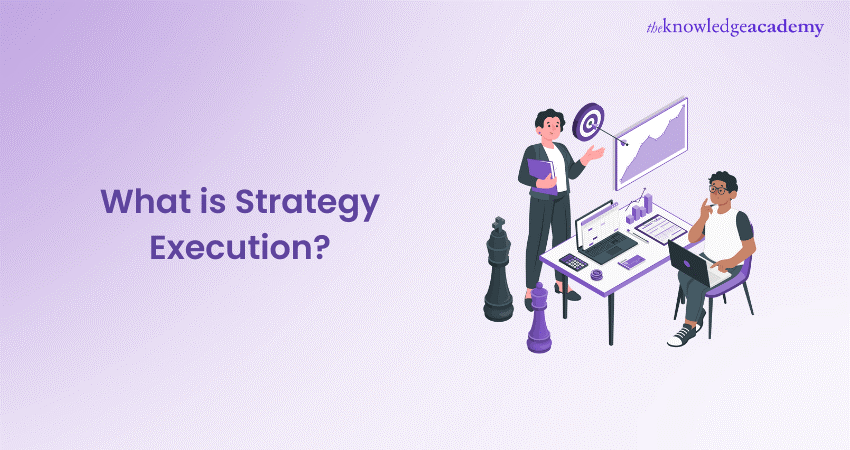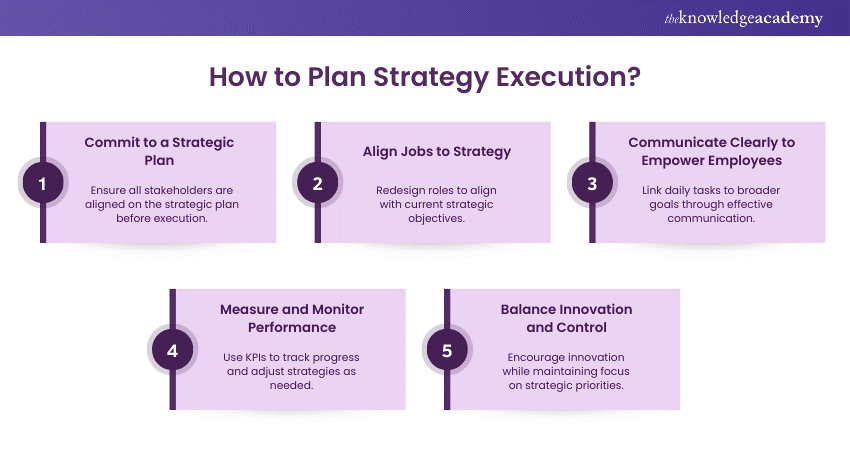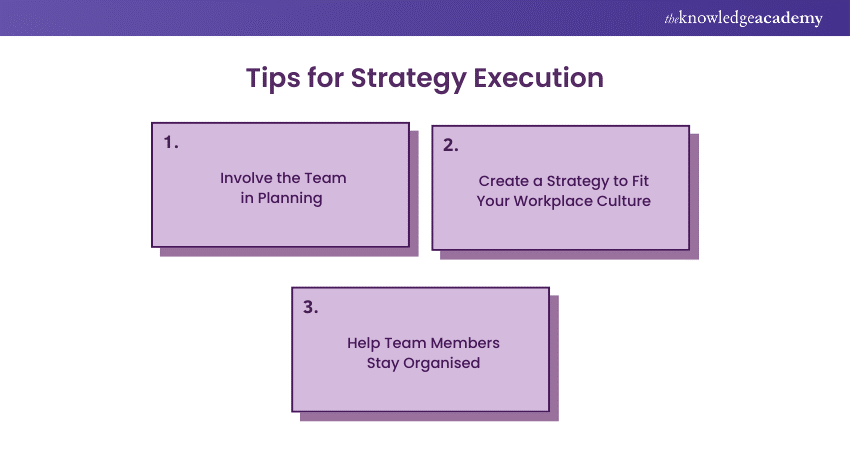We may not have the course you’re looking for. If you enquire or give us a call on +32 35001305 and speak to our training experts, we may still be able to help with your training requirements.
Training Outcomes Within Your Budget!
We ensure quality, budget-alignment, and timely delivery by our expert instructors.

A brilliant strategy is a powerful asset, but without effective execution, even the most inspired plans remain just ideas. Strategy Execution is where the magic happens—it's the journey of translating vision into action, goals into tangible results.
Many businesses invest heavily in planning, yet few achieve the results they envision. Why? Because successful execution of strategy requires a clear, structured approach, ongoing communication, and the agility to adjust as conditions change. In this blog, we’ll break down what Strategy Execution truly entails, why it’s essential for any organisation aiming to grow, and the practical steps to planning it effectively.
Table of Contents
1) What is Strategy Execution?
2) Strategy Execution Components
3) How to Plan Strategy Execution?
4) Tips for Strategy Execution
5) Strategy Execution Advantages
6) Conclusion
What is Strategy Execution?
At its simplest, Strategy Execution is the process of turning strategic ideas and plans into actionable steps. It involves implementing the chosen strategies in a way that lines up with the company's goals and objectives, ensuring resources are optimally used. Strategy Execution bridges the gap between the “what” (strategy) and the “how” (implementation), moving a company from vision to results.
Why is Strategy Execution Important?
While many organisations invest heavily in creating their strategies, few achieve success because they lack effective execution. Effective Strategy Execution is crucial because it:
1) Transforms goals into measurable outcomes
2) Ensures resources are allocated and utilised effectively
3) Enhances alignment across teams, improving focus and motivation
4) Builds resilience by adapting to changing conditions and challenges
Without execution, even the most brilliant strategies remain theoretical ideas with no impact on the real world.
Strategy Execution Components
To effectively execute a strategy, it’s vital to break it down into clear components. Each of these plays a specific role in turning a strategy from an idea into an outcome:
1) Strategy Creation
This is the foundation of any Strategy Execution process. Strategy creation involves setting clear, realistic goals, analysing the competitive landscape, and understanding customer needs. In this phase, stakeholders come together to outline what the strategy should achieve and why it’s important for the organisation.
2) Planning
Planning turns the strategic vision into a structured roadmap. It identifies the key actions, timelines, and resources needed to achieve each part of the strategy. Planning also establishes accountability by assigning tasks to specific teams or individuals and creating milestones to track progress.
3) Performance Management
This component focuses on setting up systems to measure and monitor progress. Key performance indicators (KPIs) and other metrics are established to evaluate whether the strategy is on track. Regular performance reviews help identify obstacles and provide insights into how to improve the process.
4) Communication
Clear communication is essential for aligning everyone around the strategy. This means informing and engaging all levels of the organisation, from executives to front-line employees, to make sure that everyone understands the objectives and their role in achieving them. Regular updates retains everyone on the same page, promoting transparency and teamwork.
5) Scaling
Scaling ensures that the strategy can be applied effectively across various parts of the organisation or even expanded to new markets. It involves considering how each component of the strategy can be adapted as the company grows or as circumstances change.
How to Plan Strategy Execution?
Let’s dive into a practical, step-by-step approach to planning your Strategy Execution.

Step 1: Commit to a Strategic Plan
Before starting execution, ensure all stakeholders agree on the strategic plan. Alignment among decision-makers eliminates second-guessing and fosters focus. Communication is crucial to keep everyone on the same page as strategies evolve to address challenges and opportunities.
Step 2: Align Jobs to Strategy
Roles within the organisation should be tailored to support the strategy. Misaligned roles, often created under previous strategies, can hinder progress. Tools like the Job Design Optimisation Tool (JDOT) can help redesign roles to optimize accountability, control, and influence, ensuring employees contribute effectively.
Step 3: Communicate Clearly to Empower Employees
Clear communication is essential for strategy execution. Employees must understand how their tasks align with broader organizational goals. Train managers to connect daily responsibilities to strategic objectives and create a culture that celebrates progress, enhancing engagement and focus.
Step 4: Measure and Monitor Performance
Regularly tracking progress through Key Performance Indicators (KPIs) helps assess the effectiveness of the strategy. Establish measurable goals during the planning phase and monitor trends to determine whether adjustments are needed or if objectives are on track.
Step 5: Balance Innovation and Control
Innovation drives growth, but it should not disrupt the strategy’s execution. Develop processes to evaluate new opportunities and challenges while maintaining clarity about non-negotiable aspects of the plan. Encourage employees to innovate and take calculated risks that align with strategic goals.
Elevate your career with expert decision-making skills. Learn proven strategies to make better choices with our Decision-Making Course —join today!
Tips for Strategy Execution
Here are some actionable tips to improve the success of your Strategy Execution.

1) Involve the Team in Planning
When team members are involved in planning, they feel a sense of ownership over the process. This not only motivates them but also brings in diverse perspectives, potentially revealing opportunities or challenges that leaders might have missed.
2) Create a Strategy to Fit Your Workplace Culture
Every workplace is unique. Tailor your strategy to reflect the values, communication style, and work habits of your team. Strategies that align with workplace culture are more likely to be embraced and executed successfully.
3) Help Team Members Stay Organised
Provide tools and resources to help team members stay organised. This could be project management software, regular check-in meetings, or shared calendars. Organised teams work more efficiently, meet deadlines, and maintain focus.
Strategy Execution Advantages
Implementing a well-planned Strategy Execution offers a range of benefits for the organisation:
1) Improved Efficiency: Teams that follow a clear strategy plan are more focused, organised, and productive, leading to faster results.
2) Enhanced Accountability: With clearly defined roles and responsibilities, accountability is embedded in the process, ensuring that everyone knows their contribution.
3) Adaptability: By regularly assessing and adjusting the Strategy Execution, organisations can remain flexible and responsive to market changes, customer demands, or competitive pressures.
4) Higher Success Rate: Strategy Execution increases the likelihood of achieving business goals, as it turns abstract goals into actionable steps.
5) Employee Engagement: When employees understand and see the impact of their work, engagement rises, creating a positive work environment that drives even better outcomes.
Empower your leadership journey! Learn, grow, and make an impact. Register for the Leadership Skills Course now.
Conclusion
Strategy Execution is where ideas come to life. As you plan and implement strategy in your own organisation, remember to tailor the process to your team’s strengths, monitor performance regularly, and be prepared to adapt. With these elements in place, your organisation will be well-equipped to turn its strategic goals into reality, delivering value and staying ahead in today’s competitive business landscape.
Lead with integrity! Join our Ethical Leadership Training to inspire trust, respect, and accountability in your team - Start today.
Frequently Asked Questions

The four A's of strategic execution are: Alignment, Ability, Architecture and Agility. Alignment is to point all effort toward strategy; Ability is the capacity to execute, Architecture is the structure to support it, and Agility is adaptability to adjust when needed.

The four principles of strategy are: Focus, that defines clear objectives; Leverage resources; Differentiation, which makes it highlight unique value; and Adaptation, which means it should reflect responsiveness toward the changes in the market or new insights.

The Knowledge Academy takes global learning to new heights, offering over 30,000 online courses across 490+ locations in 220 countries. This expansive reach ensures accessibility and convenience for learners worldwide.
Alongside our diverse Online Course Catalogue, encompassing 19 major categories, we go the extra mile by providing a plethora of free educational Online Resources like News updates, Blogs, videos, webinars, and interview questions. Tailoring learning experiences further, professionals can maximise value with customisable Course Bundles of TKA.

The Knowledge Academy’s Knowledge Pass, a prepaid voucher, adds another layer of flexibility, allowing course bookings over a 12-month period. Join us on a journey where education knows no bounds.

The Knowledge Academy offers various Leadership Courses, including Agile Leadership Training, High Performing Teams Training, and Executive Leadership Coaching Training. These courses cater to different skill levels, providing comprehensive insights into Delegation Skills for Effective Leadership.
Our Business Skills Blogs cover a range of topics related to effective leadership, communication, project management, and professional development, offering valuable resources, best practices, and industry insights. Whether you are a beginner or looking to advance your business skills, The Knowledge Academy's diverse courses and informative blogs have got you covered.
Upcoming Business Skills Resources Batches & Dates
Date
 Decision Making Course
Decision Making Course
Fri 27th Dec 2024
Fri 24th Jan 2025
Fri 28th Feb 2025
Fri 30th May 2025
Fri 15th Aug 2025
Fri 26th Sep 2025
Fri 31st Oct 2025







 Top Rated Course
Top Rated Course



 If you wish to make any changes to your course, please
If you wish to make any changes to your course, please


